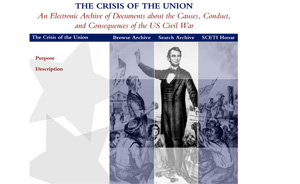talking history | syllabi | students | teachers | puzzle | about us
The Crisis of the Union: An Electronic Archive about the Causes, Conduct, and Consequences of the US Civil War
http://dewey.library.upenn.edu/sceti/civilwar/
Created and maintained by the Schoenberg Center for Electronic Text and Imaging (SCETI), with support from the Library Company of Philadelphia and SAS Computing.
Reviewed June 27–29, 2006.
The Crisis of the Union is an archive featuring documents and illustrations from the Civil War era. The material consists primarily of published material from government documents and a variety of newspapers and magazines drawn largely from the holdings of the Library Company of Philadelphia. A full search of the Web site returns 224 different documents, including thirty-three speeches mostly from prominent northern politicians (the speeches include Charles Sumner’s 1856 “Crime against Kansas,” William Henry Seward’s 1858 “Irrepressible Conflict,” and Abraham Lincoln’s 1860 “Cooper Institute”). That emphasis reflects the project’s origin, which was as an exhibition for the Library Company on the early Republican party. The result is a somewhat narrow but useful collection of major documents presented in an accessible format. Teachers will find the site a valuable resource for obtaining material for classroom use.

The site includes no narrative of the period and only a brief description of the project. A more elaborate introduction that explained the scope and purpose of the archive would help orient first-time users. Visitors may use the site to search for materials by title, author, and date, but that feature is mostly useful for users who are looking for specific items. The searches produce multiple ways for the user to preview or access each document or illustration, including a very helpful abstract of each. Curiously, the abstract feature is not available through subject searches, where it would be most helpful. For general users, the subject search is the most useful because the archive editors have created a lengthy index of keywords and ideas. One drawback of that feature is that the subject terms open in a small dialog box, which makes scrolling awkward. The hard work put into indexing the documents would benefit from a larger window so the user could see them more effectively. Items in the collection can be viewed as images in a Web page or as PDF (portable document format) files and are easily downloadable for classroom presentation.
In addition to the major speeches and policy papers collected here, the archive contains a number of graphics, particularly useful for teaching, including illustrations and political cartoons from Leslie’s Illustrated and Harper’s Weekly. Probably as a result of its original conception as an exhibition on the Republican party, the archive includes very little on the southern experience of the war. This is particularly noticeable in the materials on Reconstruction, which focus mostly on the national politics of that era. This drawback reveals the limitations of regional archives posting documents on the World Wide Web. Because most institutions do not pursue comprehensive national collections, their online exhibits will, of necessity, be somewhat more narrow and specialized than those of larger collections such as the Library of Congress’s American Memory site. On the other hand, that specialization means that smaller organizations can offer access to sources that national entities might well miss. Further, since a wealth of archival material is collected in institutions like the Library Company, providing open access through the Internet is a terrific public service. This predicament highlights the need for a meta–search engine that can reach inside the various online archives. In that optimistic vision, The Crisis of the Union will be an important part of the global resources on which teachers and students of the Civil War era will rely to understand the period.
Aaron Sheehan-Dean
University of North Florida
Jacksonville, Florida
